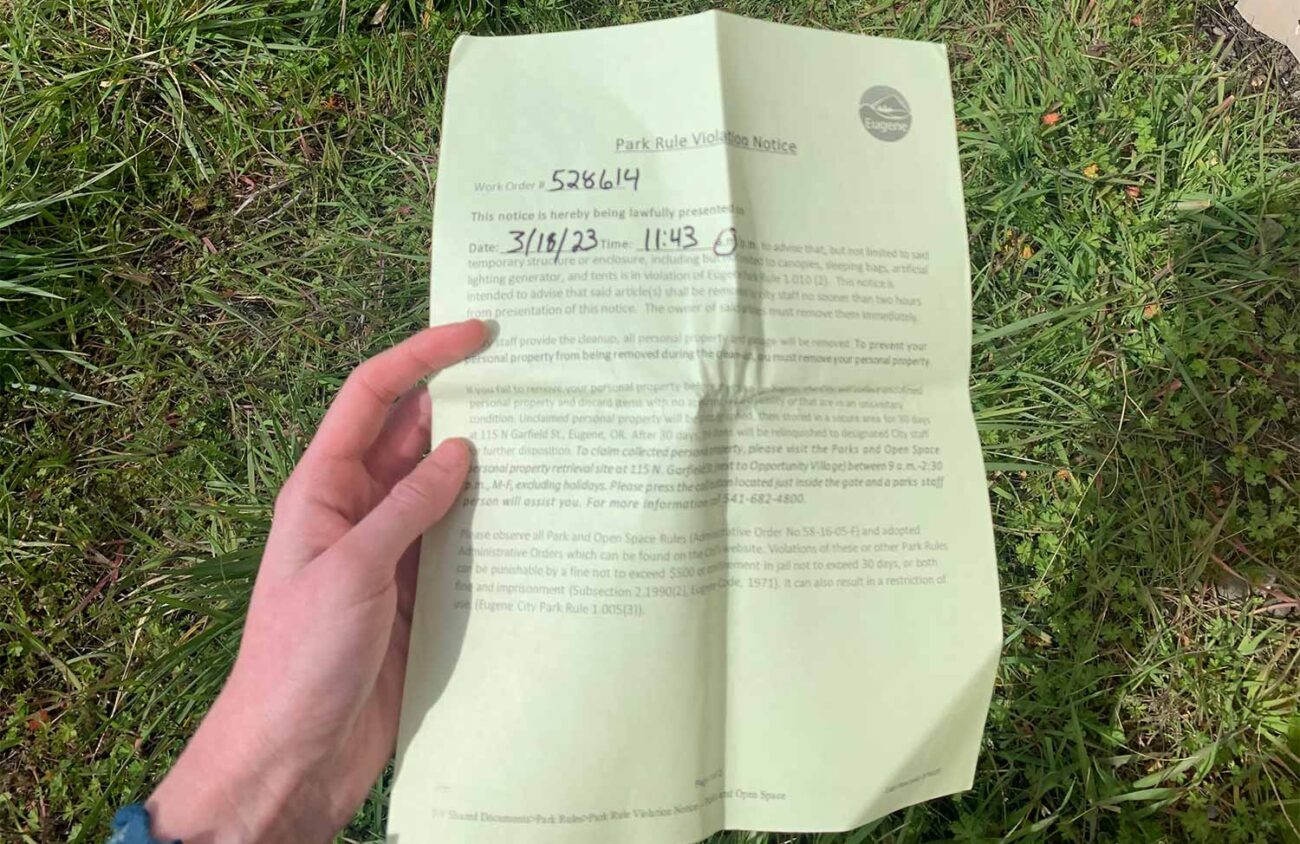A member of the Eugene Human Rights Commission pressed a city spokesman Tuesday night on why Eugene has abandoned its long-standing policy of giving unhoused campers 24 or 72 hours to move from parks.
Oregon law requires unhoused people receive 72 hours’ notice before they are forced to move from their camps.
But Eugene Weekly and the Catalyst Journalism Project reported last week that city officials — without public debate or announcement — slashed that time to only two hours for people camping in public parks and open spaces in fall 2021. (“Fast and Furious,” April 13.)
Human Rights Commission member Blake Burrell said at the group’s April 18 meeting that he and other advocates for unhoused people did not know Eugene had created exceptions to the law’s requirement. “Many service providers and members of the unhoused community are under the impression that the city was to follow a 72-hour notice practice,” Burrell said.
Burrell, a programs administrator with St. Vincent de Paul, asked Kelly McIver, a spokesman for the city’s unhoused response, why the city decided to drop the 72-hour notice in favor of giving unhoused campers only two hours’ notice.
McIver told the commission the city began using two-hour notices after House Bill 3124, which required that established camps have 72 hours’ notice before being removed, went into effect in late June 2021.
Oregon law doesn’t define what an established campsite is. After speaking to the city attorney’s office, the city created a new category for camps that are in place for less than 24 hours and are exempt from the notice requirement: non-established camps.
McIver also said city parks rules prohibit erecting structures in parks, such as tents, and that the park rules prohibit people from staying in parks after they close at night.
“That’s why, in part, we’re giving those notices and letting people know as quickly as possible so that people aren’t investing in this being a place where they are going to be on an extended basis,” he said.
Since October 2021, the city has issued around 1,400 two-hour notices to unhoused campers. The use of these notices has shot up over the last few years, with more than half of all unhoused campers being given only two hours to move before city workers clear their camps.
Records show the city appears to have set an all-time record in 2022 for issuing camping evictions — more than 2,400, a 36 percent increase in one year.
“Although city staff reminded us that these park rules do apply to all citizens, there is a profound difference between being asked to take down a canopy tent for a barbeque and being asked to move the tent you are sheltering in,” Burrell writes in an email to EW. “This argument is an example of ‘equality’ versus ‘equity,’ and is counter to the messaging of the equity component of diversity, equity and inclusion that all city staff is trained on.”
Burrell asked McIver about where campers who have their possessions removed after receiving a non-established camp notice are supposed to go. McIver said people could find shelter at Eugene Mission or Dawn to Dawn (formerly known as Dusk to Dawn), which is operated by St. Vincent de Paul.
Burrell, who works for St. Vincent de Paul’s homeless and emergency services in Lane County, pointed out that the nonprofit’s Dawn to Dawn shelter site requires people to register by 2 pm. He also noted the shortage of shelter beds available in Eugene.
Burrell, co-chair of the commission’s Homelessness and Poverty Work Group, said the reporting in EW’s story will spark a longer and more in-depth conversation between city officials and advocates for unhoused people.
“I really do see this practice,” Burrell said at the meeting, “as something that really could be compromising our ability to pursue this idea of a human rights city.”
Burrell writes in the email that the Homelessness and Poverty Work Group will conduct listening sessions this spring and may be able to advise the city to extend the amount of time unhoused campers have to move their belongings in parks.
“When you have limited shelter beds and this many individuals and families entering into homelessness each month, the municipal strategy has to reflect the fact that individuals will be seeking sanctuary in our public space,” he says. ν
The Eugene Human Rights Commission meetings are open to the public and take place 5:30 pm the third Tuesday of the month. Find more information at Eugene-or.gov/526/Human-Rights-Commission or email HumanRights@eugene-or.gov.
THIS STORY WAS DEVELOPED AS PART OF THE CATALYST JOURNALISM PROJECT AT THE UNIVERSITY OF OREGON SCHOOL OF JOURNALISM AND COMMUNICATION. CATALYST BRINGS TOGETHER INVESTIGATIVE REPORTING AND SOLUTIONS JOURNALISM TO SPARK ACTION AND RESPONSE TO OREGON’S MOST PERPLEXING ISSUES. TO LEARN MORE VISIT CATALYSTJOURNALISM.UOREGON.EDU OR FOLLOW ON TWITTER @UO_CATALYST.
